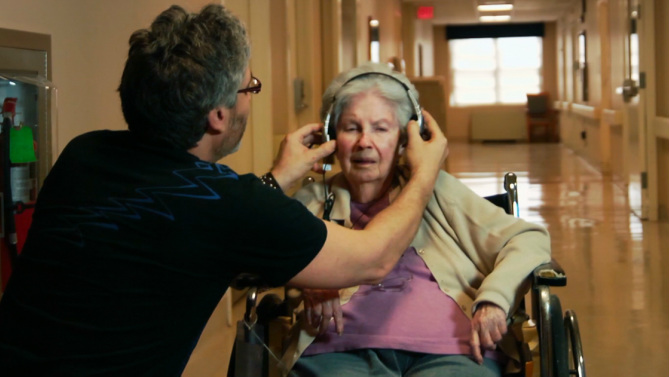My memories are not unique. Millions of our nation’s elders live in nursing homes. Most of these institutions are structured like hospitals, with impersonal care that consists mostly of medications. Many of these people don’t have anyone to visit them, and have become isolated. We as a society have come to place so much value on youth and that we shut away our elders because we don’t want to be reminded that we will not always be young. How did things get to be this way, and how can we fix it?
Social worker Dan Cohen had these same questions, and an answer to them. He had a very simple idea: to give the residents of nursing homes music. But not just any music; music that meant something to them, music they could connect with, that would bring back some of their memories. And so Dan slowly but surely started collecting money so he could distribute ipods to nursing home residents all over the country, and give them their music.
But how effective is this, you may very well ask. Well, it is astoundingly effective. One man interviewed for the movie was named Henry; he had Alzheimer’s and hardly ever spoke a word to anyone. But when he was given music, some of his favorite Louis Armstrong jazz pieces, he suddenly just came alive. His eyes lit up, he started talking, telling stories about his past, and even singing. This man, who had been nearly unreachable, was able to communicate and open up because of this music. The music provided a way out, to connect with others.
And Henry wasn’t alone. This film shows the same thing happening again and again and again, from a woman suffering from bipolar schizophrenia to a woman with Alzheimer’s so advanced she was nearly in a coma. And it never gets old, seeing these people go from living vegetables to active and engaged once again. Dan and other social workers and doctors explain how music is able to open up people on an emotional, social, and even biological level. It is because our medical system does so much to care for our elders’ bodies but nothing for their hearts and minds. But seeing these people transform is one of the most touching things I’ve seen on a movie screen in a long time.
Alive Inside was created by filmmaker Michael Rossato-Bennet, who over a period of three years followed Dan’s work. He did this because he was amazed at the profound impact that just a little music can make. And he’s not the only one: the film won the prize for Audience Award: U.S. Documentary at the 2014 Sundance Film Festival. Also, the section of the film showing Henry’s transformation once he got his music was posted to YouTube a couple of years ago and went massively viral, spawning a large amount of interest in the project and giving Dan the boost he needed to get music into more nursing homes, many of which had previously resisted the idea due to it being “unconventional”. Hopefully, the full release of this film will provide the impetus to make sure that every nursing home resident in America gets their music, and to enact more reforms after that.
Alive Inside is one of the most touching documentaries I’ve seen in a long time. It is, at its core, a simple story about helping people who have been virtually abandoned by modern society. It will bring a tear and a smile to the face of anyone with a grandparent, especially one in a nursing home or with Alzheimer’s. I just wish I had known about this music therapy when my grandmother was still here.
Grade: A

 RSS Feed
RSS Feed
